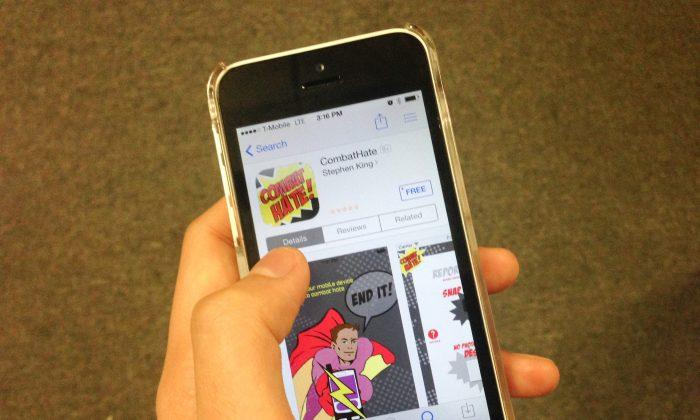NEW YORK—People are more connected than ever through social media and the Internet. But these new forums come with an array of new problems. Cyberbullying and digital hate have a growing impact on social media and internet users, especially children and teenagers.
The CombatHate app was created to address these issues. People can use the app to report acts of violence or hatred they witness online or in real life. Launched by the Simon Wiesenthal Center, the app can be downloaded for free from Apple and Android smartphones.
The launch of the app was held at the New York Museum of Tolerance, which is part of the Simon Wiesenthal Center, a human rights organization that frequently deals with issues involving racism, hate, anti-semitism, and terrorism. Founded 36 years ago by Holocaust survivor Simon Wiesenthal, the center has a 16-year history of combating digital terrorism and hate.
Twelve students from the Eagle Academy for Young Men in the Bronx came to the launch. They are mostly high school seniors enrolled in the schools’ computer science program.
“We encounter a lot students that, with mobile technology now [and] different apps that exist like Facebook, Instagram, Twitter. It’s very easy for them to target a student or another group of students and post about them,” said Jason Bissonnette, a teacher at the Eagle Academy for Young Men in the Bronx.
“We found as teachers that sometimes students on Facebook are creating private groups that only certain students can get invited to, where it’s very targeted, very hateful messages that are being posted,” said Bissonnette.
The app may not be the ultimate solution, but it can certainly help eliminating come hateful pages and comments from the Internet. Users open the app and have a choice of taking and uploading a picture or describing a situation if there is no photo. Once a photo is uploaded, the app will ask for an email address, the date of the occurrence, and a brief description of what the user witnessed. Finally, just hit send and the occurrence will be reported. The process is anonymous and email addresses are not stored.
Users can report anything from Facebook hate pages to hateful comments posted on websites. And it doesn’t stop at the Internet. Users can also report if they witness hate crimes in daily life, like hate graffiti on religious buildings, etc.
“Depending on how serious it is, we have connections to Facebook, to Twitter, to a lot of the corporate offices and we may call them and say ‘hey, you guys gotta get this off your site,’” Steven Burg, Director of Eastern Region for the Simon Wiesenthal Center.
The impact of the app depends on how many people use it. Bissonnette believes that the launch of the app will benefit students because it will get the conversation started on combating hate and promoting tolerance.
“I know the students today that are here are going to come back and talk about this with their peers,” Burg said. “It is going to open up the doors to talking about it, which is one of the most important things, because a lot of this is hidden.”
Yi Yang is a special correspondent in New York.





Friends Read Free